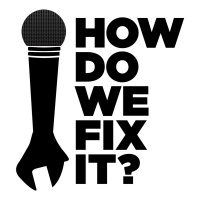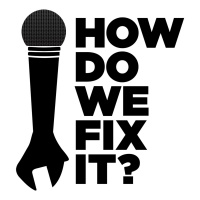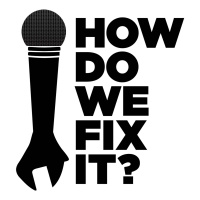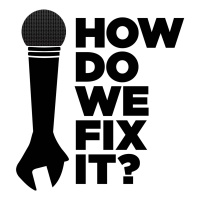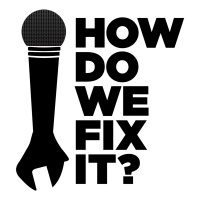How Do We Fix It?
- Autor: Vários
- Narrador: Vários
- Editor: Podcast
- Duración: 183:37:18
- Mas informaciones
Informações:
Sinopsis
From politics to the personal, we're about solutions. Our weekly podcast features two friends and longtime journalists. Join Richard Davies (ABC News) and Jim Meigs (Popular Mechanics) as they challenge authors, experts and provocateurs in a search for positive, practical ideas. Guests include Alan Dershowitz, a noted legal scholar and defender of civil liberties; Mike Rowe of "Dirty Jobs" and Lenore Skenazy, founder of "Free Range Kids." Topics include politics, parenting, personal finance, human behavior and much more. "How Do We Fix It?" - a repair manual for the real world. Produced by DaviesContent
Episodios
-
Changing the Way We Vote: Rob Richie
17/12/2021 Duración: 26minGerrymandering, low turnout elections, negative campaign ads, and increased polarization are all part of the flawed, fractured U.S. political system. Here we examine the case for constructive changes to how candidates for public office are elected.Our guest, Rob Richie, has been the leader of the non-profit advocacy group, FairVote, since co-founding the organization in 1992. He has been involved in helping to develop and implement: Ranked Choice Voting in several states and more than 20 cities, fair representation voting systems in numerous states, Voting Rights Act cases, the National Popular Vote plan in 16 states, and voter access proposals like voter preregistration and automatic voter registration."We're in a winner-take-all environment and it's incredibly tense," Rob tells us. The current voting system allows for only one choice, which can add to bitterness and deep division. "Ranked Choice Voting gives the voter a chance not only to just put an X next to one candidat
-
Better Policing — Not Posturing: Nekima Levy Armstrong
10/12/2021 Duración: 29minThe huge difference between slogans and solutions is a key theme of this episode. While demands to “de-fund the police” or replace entire police departments with something new might sound good in theory, these ambitious experiments in public safety may backfire.Our guest is Minneapolis civil rights lawyer and activist Nekima Levy Armstrong. Her recent New York Times op-ed— “Black Voters Want Better Policing, Not Posturing by Progressives”— was written after the defeat of a November ballot initiative that would abolish the Minneapolis Police Department and replace it with a department of public safety. She expressed frustration over the lack of a detailed, well-researched plan.While white progressives mostly voiced support for the proposal, majority-black neighborhoods rejected it. We find out why.In the months after the murder of George Floyd, there was a massive outcry over police violence against African-Americans. The protest movement was multi-racial. In many towns and cities, Whites marche
-
Stopping the Next Pandemic. Alina Chan (Part Two)
03/12/2021 Duración: 24minA crucial step in preventing the next global pandemic will be knowing where this one came from. Did SARS-CoV-2— the virus that causes Covid-19— jump from animals to humans, or was the outbreak the result of a lab leak? The world still doesn’t know the answer. This episode is part two of our wide-ranging interview with Alina Chan, a postdoctoral scientist who co-wrote an explosive online paper in May 2020. She argued that scientists and governments should investigate whether a virus from a laboratory in Wuhan, China caused the pandemic.“It's not about holding one country accountable, because we are all accountable for this,” Alina tells us. “We're all in this together.”In this episode, we discuss the need for much greater transparency when viral outbreaks occur. The world needs to adopt new policies and strategies to prevent or mitigate future outbreaks. Proposed solutions include: more regulation of scientific experiments— including “gain of function” research, better lab safety stan
-
Did COVID-19 Come From a Lab? Alina Chan (Part One)
24/11/2021 Duración: 29minTwo years after the known human case of COVID-19, the mystery of the origin of SARS-CoV-2 remains unresolved. Did the virus emerge from an animal in nature, or could it have accidentally leaked from a research lab in Wuhan, China? Shockingly, the world appears to be no closer to knowing the crucial answer.In this first of two episodes, we get a brief explanation of the growing controversy from our co-host, Jim Meigs, who has written about allegations of a scientific cover-up. Molecular biologist Alina Chan, a postdoctoral fellow in a gene therapy lab at the Broad Institute, is our interview guest.Dr. Chan first became widely known last year for suggesting that COVID-19 could have escaped from a laboratory. Her early research was called a "conspiracy theory" by leading scientists and mainstream media journalists. But in recent months, expert views of this mystery have decisively changed.Alina Chan and British science writer Matt Ridley
-
Understanding Autism: "We're Not Broken." Eric Garcia
19/11/2021 Duración: 25min"This book is a message from autistic people to their parents, friends, teachers, coworkers and doctors showing what life is like on the spectrum," writes our guest, author Eric Garcia in We're Not Broken. "It’s also my love letter to autistic people. For too long, we have been forced to navigate a world where all the road signs are written in another language.”Garcia, who is autistic, is a senior Washington correspondent for The Independent. He has worked as a writer and reporter covering politics at The Washington Post, The Hill, and the National Journal."My main point is autistic people are fine as they are," Eric tells us in this episode. “The idea that they are fundamentally flawed and failed human beings is simply not true... Instead of trying to cure autistic people, society should help them live fulfilling lives.”For many decades, people with autism have been stigmatized and subjected to harmful myths and wild conspiracy theories— all of them hurtful. We examin
-
Social Media: Menace or Blessing? Robby Soave
12/11/2021 Duración: 34minNot long ago, most of us embraced social media as a life-changing opportunity to connect with friends and family all across the world. Today, public opinion, including members of Congress from both parties, has turned far more negative. Facebook, Twitter, Google, YouTube, and other tech giants are accused of corrupting our democracy, spreading disinformation, and fanning the flames of hatred.Our guest is Robby Soave, a libertarian author and journalist who is a senior editor for Reason and the author of two books: "Panic Attack: Young Radicals in the Age of Trump" and his latest, "Tech Panic: Why We Shouldn't Fear Facebook and the Future."Robby is highly skeptical of most efforts to reform or break up technology firms. In a lively conversation we explore some of the biggest issues animating both right and left: bias, censorship, disinformation, privacy, screen addiction, crime, and more."There are certain legitimate problems with big tech and social media," Robby tells
-
Climate: Changing the Conversation. Katharine Hayhoe
05/11/2021 Duración: 29minAs world leaders discuss the planet's future at COP26 in Glasgow, climate change remains a massive challenge and a source of fierce debate. While two-thirds of Americans think that the government should be doing more, it's tempting to throw our hands up in despair and think: "There's nothing I can do."Climate scientist Katharine Hayhoe begs to differ. She says the most important thing is to talk about it—and she wants to teach us how. In this episode, we discuss her hopeful, passionate case for enacting positive change from the ground up, and the finding of her new book, "Saving Us: A Climate Scientist's Case for Hope and Healing in a Divided World."Katharine shares the science of climate change, how to talk about it across the political divide, and personal stories about engaging highly skeptical audiences, such as when she spoke to a crowd of conservative business leaders in West Texas at a meeting of Rotarians. The outcome was
-
Together Again. Cultivating Collaboration: Deb Mashek
29/10/2021 Duración: 26minMany millions of Americans are heading back to work — in person — for the first time since the pandemic hit. During this time of remote meetings and working from home, many of us learned new skills, and perhaps, forgot our old ways to work and successfully collaborate with colleagues.This episode is a timely and very personal reminder of how to make meetings better and develop stronger, more productive relationships with those we work and live with. We learn about the crucial differences between exchange and communal forms of collaboration. Our guest, former psychology professor, and national non-profit head, Deb Mashek, spent two decades studying how people form relationships with each other, as well as the challenges & rewards of doing so. Deb founded MyCo Consulting, where she puts her research into practice, helping academic leaders cultivate collaboration among diverse stakeholders to accomplish ambitious goals.The skills needed to collaborate w
-
The Furore Over Critical Race Theory: "Banished" Podcast
15/10/2021 Duración: 27minFrom local school board elections to state legislatures, an impassioned nationwide debate has erupted over allegations that Critical Race Theory (CRT) is being taught in public schools.Anti-CRT bills have been passed in more than two dozen Republican-led states. What do we mean by Critical Race Theory? What are these laws aiming to accomplish? How will they affect schools in the US? We share a lively discussion from "Banished", a new podcast series, hosted by Amna Khalid, a history professor at Carleton College.In this episode we listen to interviews with Harvard Law Professor Randall Kennedy, Acadia University Professor Jeffrey Sachs, and former ACLU President, Nadine Strossen of New York Law School. All three support free speech and disagree with banning the teaching or discussion of controversial, even dangerous ideas and theories.This is a special episode of How Do We Fix It? We're taking a break during mid-October and continue a recent tradition of sharing stimulating, thoughtful interviews fro
-
The Way Out. Overcoming Polarization. Peter Coleman
08/10/2021 Duración: 27minNever before in living memory has America been as politically polarized as it is today. We are divided by our politics, Facebook and other social media sites, and by news media. Nearly half of us have stopped talking with someone about political topics as a result of what they said in person or online. Our culture of contempt is dividing us all and making America ungovernable.How do we use science and proven methods to reduce toxic polarization and push back against conflict entrepreneurs? This episode presents a way forward. Peter Coleman is a leading expert on intractable conflict and sustainable peace. He's a professor of psychology and education at Columbia University, and director of the Morton Deutsch International Center for Cooperation and Conflict Resolution. Peter's new book is "The Way Out. How to Overcome Toxic Polarization."We discuss research on how deeply divided societies can and do change. We learn more about the role you can play to
-
Scary Smart. The Future of Artificial Intelligence. Mo Gawdat
01/10/2021 Duración: 28minImagine a future where smart machines are more intelligent than humans. That future may be coming much faster than we think. The stark implications are considered in this podcast. The former Chief Business Officer at Google X, Egyptian entrepreneur Mo Gawdat has long been at the heart of the artificial intelligence revolution, deeply involved in engineering, robotics, and AI. Mo is also a podcaster with a focus on how we can promote happiness. In his latest book, "Scary Smart", he argues that AI reflects our values and that unless humans change their online behavior, the consequences could be terrifying. "The true pandemic of our times is not COVID-19, Mo tells us. "AI is the real pandemic. It's at its infancy and will grow in intelligence until a point where it is undisputed that they will be the leaders."In less than ten years, he predicts, we will experience "the singularity", when artificial intelligence will be many times smarter than humans. But not all
-
Taming Big Tech. How We Can Reboot. Jeremy Weinstein and Mehran Sahami
24/09/2021 Duración: 35minThis episode addresses a great problem of our age: How do we curb the enormous power of giant technology companies and limit the disruption caused by them and their products?20 years ago, we lived in an era of digital utopianism when most people thought that the internet would give us new freedom to find information. But we didn't anticipate many of the most disturbing technological changes. Today, a handful of firms control most internet communication. Social media platforms amplify division more than they spread knowledge. Our guests are two Stanford University professors, Mehran Sahami and Jeremy Weinstein. Along with philosophy professor Bob Reich, they wrote the new book, "System Error: Where Big Tech Went Wrong and How We Can Reboot." Mehran Sahami teaches engineering and education at Stanford and is also a former senior research scientist at Google. Jeremy Weinstein teaches political science at Stanford. He previously worked in the Obama Administration. Both teac
-
Wildlife! When Nature Hits Back: Mary Roach
17/09/2021 Duración: 28minThe line between our “civilized” lives and wild, unpredictable nature seems to have gotten a little thinner lately. Nature is great, but it can also be dangerous if we don’t show proper respect. This show is about awkward encounters with bears, mountain lines, gulls and other wild creatures. We also discuss "killer trees" with best-selling science writer, Mary Roach, author of the new book, "Fuzz: When Nature Breaks the Law".Mary is widely known for her funny, smart and sometimes gross writing and reporting in a series of books with one-word titles. Previously, we spoke with her about "Grunt", which looks at the surprising science of war. She also wrote "Stiff" about — you guessed it — dead people, "Gulp" on the digestive tract, and "Bonk" where we learn all about sex.Mary Roach has been called America's funniest science writer by the Washington Post. In the words of a reviewer in The Guardian, she "has specialized in tackling the uncomfortable, and at the heart of every book is her desire
-
9/11 Attacks: Myths, Memories, Conspiracy Theories
10/09/2021 Duración: 26min"I now believe the 9/11 Truthers I encountered were canaries in the coal mines of American society," writes our co-host, Jim Meigs, in the current issue of City Journal. In this episode we hear about conspiracy theories, those who believe in them, and the corrosive impact of paranoia on American political life.Richard interviews Jim about his work at Popular Mechanics in the years after the 9/11 attacks. A team of reporters, editors, and fact-checkers at the magazine interviewed more than 300 experts and sources in civil engineering, air traffic control, aviation, fire fighting, and metallurgy. Their findings were published in the 2006 book, "Debunking 9/11 Myths. Why Conspiracy Theories Can't Stand Up to the Facts."Jim also asks Richard about his reporting from the streets of Manhattan in the hours and days after the attacks that brought down the North and South Towers of The World Trade Center twenty years ago."I fell in love with the city during that September. In the words of a friend.
-
Hey, Journalists. Does the Public Trust You? Joy Mayer
03/09/2021 Duración: 25minOnly four in 10 Americans say they have a lot of trust in the news media. That's a big problem for our democracy. While journalists are supposed to tell the truth and get the story right, just 35 percent of right-of-center voters have some trust in what they see in the news.Democrats and independents are much more likely to trust journalists, but Americans of almost all shades of opinion are skeptical toward the news media, questioning not only the quality of journalists’ work but their intentions behind it.Our guest is Joy Mayer, Director of the non-profit Trusting News, which is working with local newsrooms around the country to help journalists earn consumers' trust.While many reporters, writers and editors are reluctant to discuss their political views, most journalists have liberal or progressive views. "I think it's something we need to talk about more openly," Joy tells us.In this episode, we look at bias, transparency, and constructive steps that
-
American Isolationism and the Fall of Afghanistan. Charles Kupchan
27/08/2021 Duración: 27minFor much of its history, the United States kept the rest of the world at arm's length. What happened in the decades after the 1941 military strike on Pearl Harbor, and several years after the 9/11 attacks, could be seen as an aberration.The sudden, chaotic withdrawal from Afghanistan, the Taliban takeover, and resulting humanitarian disaster may lead to another American foreign policy shift, plus a far greater reluctance to deploy U.S. forces overseas. While isolationism is derided by policy experts and global elites, this movement has a surprisingly enduring legacy. We examine it here.Charles Kupchan is a professor of international relations at Georgetown University and a Senior Fellow at the Council on Foreign Relations. "Isolationism: A History of America’s Efforts to Shield Itself from the World" is his most recent book. We share extracts from an interview with Charles by Justin Kempf, host of the Democracy Group podcast, "Democra
-
Identity Politics: Dignity and Resentment. Francis Fukuyama
13/08/2021 Duración: 27minSuccessful politicians on the right and left often use anger and resentment to build support for their campaigns. "A lot of our politics is dignity politics," argues Stanford political scientist, Francis Fukuyama, our guest in this episode. "It's one group saying, 'look, you are not taking us seriously. You disregard our rights and we demand a different kind of world.'"We discuss whether identity politics are damaging our democracy at a time of deep polarization when many national and global institutions struggle to respond to growing challenges. "We have shifted from arguing about economic policies to arguing about identities," Fukuyama tells us. In his book, "Identity: The Demand for Dignity and The Politics of Resentment," he warns that unless we forge a clear understanding of human dignity, we will doom ourselves to continuing conflict. We discuss other solutions, including the need for more civics education, national service, and the benefits of universal healthcare and other policies that help
-
#315 Living Better With COVID: 6 Fixes. Hosts Jim and Richard
06/08/2021 Duración: 28minIn this special episode, Richard and Jim have an extended conversation around six solutions to help us manage the pandemic more successfully, and improve responses to future public health emergencies.1. Have a more realistic view of the virus. This includes understanding that the virus won't go away anytime soon. Clear, honest communication from the media and government health officials will help. 2. Restoring Trust. Greater transparency by public health officials and honesty about what is not known are two ways to improve understanding and trust.3. Improve access to care and medical literacy. 4. Focus on the severe cost of the pandemic to children. 5. Make it Harder for People to be Unvaccinated.Over 95% of new COVID-related hospital cases are among unvaccinated Americans.6. COVID will probably increase life expectancy: The virus has led to advances in mRNA vaccines and viral medicine. The pandemic will speed up and intensif
-
Reading is Vital for Democracy: Joseph Luzzi
29/07/2021 Duración: 22minAmerica is facing a reading crisis, and this has profound impacts on how we engage with the world. The number of adults who read books for pleasure fell by more than 30% in less than 15 years. Researchers found that Americans watch TV three hours a day, but spend less than 30 minutes reading. "Reading is seeing the world through someone else's eyes," says our guest, Joseph Luzzi, Professor of Comparative Literature at Bard College. "I think of social media as a mirror. You look into it and your tastes and interests are reflected back on you. Literature is a prism. You look into it and you are engaged." Recent neuroscience research suggests fiction literature helps people develop empathy and critical thinking. The decline in reading and the popularity of social media may have profound impacts on democracy, feeding into our deep partisan division, and reinforcing extreme opinions.In this episode, we also discuss how reading Dante helped save Joseph after he became a widow
-
Fix More, Waste Less. Right to Repair. Sandra Goldmark
23/07/2021 Duración: 27minOur relationship with our stuff is broken. What was once fixed is often tossed into landfills. Repairs today are more expensive than the prices of many new clothes, gadgets, and household appliances.The U.S. has 5% of the world's population, but consumes about 30% of the world's resources and creates almost a third of the world's waste. Large manufacturers restrict the repair of their goods by limiting the availability of parts and repair information. Their policies sparked a consumer backlash and a growing right-to-repair movement. This week, The Federal Trade Commission said it wants to give consumers new rights to fix devices and limit "unfair anti-competitive restrictions" by manufacturers.Our guest, Sandra Goldmark, is a leader in the movement to demand better “stuff.” She doesn’t just want to help us clear away clutter—she aims to move us away from a throwaway culture, to teach us to reuse and repurpose more thoughtfully. We discuss her new book, "Fixation: How to Have

